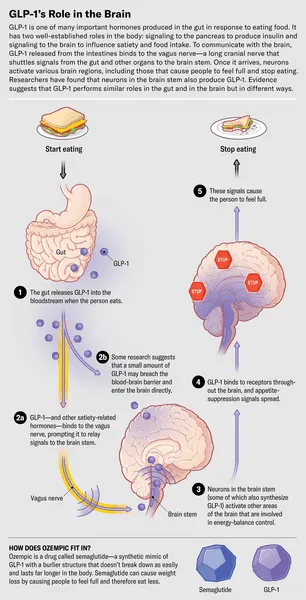Have you ever wondered how certain medications can impact your appetite? You might be familiar with Ozempic, a medication often prescribed for type 2 diabetes. But did you know that it can also affect your appetite in various ways? This article will help you understand how Ozempic influences your hunger and eating patterns, providing insights that might be beneficial if you’re considering or currently using this medication.
What is Ozempic?
Before diving into the specifics of how Ozempic affects appetite, it’s essential to grasp what it is. Ozempic is a brand name for semaglutide, a medication used primarily for the management of type 2 diabetes. It belongs to a class of drugs called GLP-1 receptor agonists.
The Role of GLP-1 Receptor Agonists
GLP-1, or glucagon-like peptide-1, is a hormone naturally found in your body, playing a crucial role in blood sugar regulation. GLP-1 receptor agonists, like Ozempic, mimic the function of this hormone, leading to various beneficial effects. Through this mechanism, Ozempic helps in balancing blood sugar levels, which is crucial for individuals with type 2 diabetes.
How Ozempic Works in the Body
Understanding the mechanism of Ozempic provides insights into its effects on your appetite. Once injected, Ozempic binds to GLP-1 receptors, primarily found in the pancreas, brain, and digestive system.
Effects on Blood Sugar Levels
By activating GLP-1 receptors in the pancreas, Ozempic enhances insulin secretion, especially after meals when blood sugar tends to spike. Concurrently, it reduces the release of glucagon, a hormone that raises blood sugar levels. This dual action results in more stable blood sugar levels, which can indirectly influence appetite by reducing the probability of hunger spikes related to blood sugar dips.
Interaction with the Brain
The brain plays a significant role in appetite regulation. Ozempic’s action on GLP-1 receptors in the brain contributes to this regulation, leading to a feeling of fullness or satiety. This effect is particularly influential in altering appetite and influencing your eating patterns.
How Ozempic Affects Your Appetite
Now that you understand the fundamental workings of Ozempic, let’s explore how it specifically affects your appetite. The medication’s influence on appetite stems from its interaction with your brain and digestive system.
Promoting a Feeling of Fullness
One of the most direct ways Ozempic affects your appetite is by promoting satiety. By activating GLP-1 receptors in the brain involved in hunger signals, Ozempic can make you feel full sooner than usual, potentially leading to reduced food intake.
Slowing Gastric Emptying
Another action of Ozempic is that it slows down gastric emptying, which means food stays in your stomach longer. This can prolong the sensation of fullness, reducing the frequency and urgency of hunger pangs.
Effects on Weight Loss
Interestingly, because Ozempic helps suppress appetite, it has been associated with weight loss in some individuals. By feeling full sooner and not experiencing hunger as intensely, you might naturally consume fewer calories, leading to weight loss over time.
The Impact of Reduced Appetite on Daily Life
Experiencing a change in appetite can have varying effects on your daily life. It’s useful to be aware of these potential impacts to better manage them.
Adjusting Eating Habits
With a dampened appetite, you may find yourself naturally adjusting your eating habits. Smaller portion sizes and skipping unnecessary snacks can become part of your routine. This adjustment might require a conscious effort initially, especially if you are accustomed to regular eating patterns.
Monitoring Nutritional Intake
While eating less can aid in weight management, it’s vital to ensure you get the necessary nutrients. Maintaining a balanced diet is essential to prevent deficiencies that could arise from significantly reduced food intake.
Social and Emotional Implications
Food is often a central element in social settings. By understanding Ozempic’s effect on your appetite, you can plan your social activities better, ensuring you can enjoy gatherings without feeling pressured to eat more than you need.
Possible Side Effects and Considerations
As with any medication, Ozempic comes with potential side effects and considerations, particularly concerning appetite and digestion.
| Side Effect | Description |
|---|---|
| Nausea | Often experienced initially, but might reduce over time |
| Diarrhea or Constipation | Related to slowed gastric processes |
| Appetite Loss | Can be significant, requiring dietary adjustments |
| Possible Weight Loss | May be a beneficial side effect for some individuals |
Managing Side Effects
While some side effects, like nausea, tend to be more pronounced in the beginning stages of treatment, they often subside. Eating smaller, more frequent meals and staying hydrated can help mitigate these effects.
When to Contact a Healthcare Provider
It’s crucial to keep communication lines open with your healthcare provider when taking Ozempic, especially if changes in appetite become troublesome.
Evaluating Sustained Appetite Loss
If you find that appetite loss leads to unintended weight loss or affects your nutritional intake, it’s time to consult with your healthcare provider. They can offer guidance on how to adjust your regimen or dietary habits to ensure you’re getting the necessary nutrients.
Balancing Risk vs. Benefit
Every treatment has a balance of risks and benefits. Your healthcare provider can assist in evaluating whether the appetite-related effects of Ozempic align with your health goals or if adjustments should be made.
Conclusion
Navigating the relationship between Ozempic and appetite involves understanding complex interactions within your body. While it can significantly alter your feeling of hunger, leading to appetite suppression and potential weight loss, individual experiences may vary. Awareness and proactive management of these changes will ensure Ozempic’s effects are both beneficial and manageable in your life. Keeping an ongoing dialogue with your healthcare provider remains a pivotal part of successfully incorporating this medication into your healthcare routine. Whether it’s adjusting to a new eating pattern or managing side effects, being informed is your best tool in handling the changes Ozempic may introduce to your appetite.


